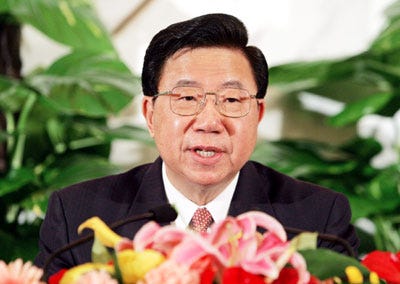After 28 years, do Hong Kong officials really get what Beijing wants?
Reprinted from today's SCMP 07/07/2025
Jiang Enzhu, the first head of the central government’s liaison office in post-handover Hong Kong, famously likened understanding the city to reading a challenging book – one that demands serious attention and effort. At the time, his words served as a cautionary note to mainland officials.
Now, as Hong Kong marks the 28th anniversary of its return to Chinese sovereignty, Jiang’s analogy remains apt, though with a significant caveat. The city may still be a book that is difficult to decipher, but today’s Chinese officials may not share Jiang’s eagerness to truly grasp its complexities.
The metaphor applies both ways: for many Hong Kong residents, the intricacies of Chinese politics have proven to be just as challenging to interpret. Fully appreciating this dynamic in cross-border relations is essential to understanding what has gone awry in Hong Kong and to contemplating its future.
The stakes are high. The city stands at a critical juncture. The “one country, two systems” principle guarantees Hong Kong a high degree of autonomy and a capitalist system for 50 years. With just 22 years remaining, the city has come under increasing international scrutiny.
We can lay to rest an enduring myth from the early years: that physical proximity, coupled with the daily flow of people, goods and investment, would naturally foster deeper understanding between Hong Kong and the mainland. This assumption presumes that Hong Kong residents should possess a sophisticated grasp of Chinese politics, while Beijing should, in turn, appreciate Hong Kong’s unique cultural and economic identity.
The years have shown that reality is far more complex. Mutual understanding has arguably not deepened. If anything, misunderstandings, misjudgments and missteps by both sides have further complicated the relationship.
In the first six years after 1997, both sides – buoyed by optimism – were eager to showcase the viability of one country, two systems. Beijing saw a thriving Hong Kong as a potential model for future reunification with Taiwan. The central government’s hands-off approach was epitomised by the proverb Jiang Zemin famously quoted: “The river water does not interfere with the well water.”
Beneath this facade of stability, however, anxieties simmered. Hongkongers feared the erosion of freedoms enshrined in the Basic Law, the city’s mini-constitution, while Beijing worried about “hostile foreign forces” exploiting Hong Kong’s open society to undermine the Communist Party’s rule on the mainland.
The failed attempt in 2003 to enact Article 23 of the Basic Law – legislation against treason, secession, sedition, and subversion – exposed a deep chasm of misunderstanding. The massive July 1 march that year, which drew half a million participants, forced the government to shelve the law, marking the end of the “honeymoon” period and ushering in a strained dynamic, characterised by growing suspicion and a gradual erosion of trust on both sides from 2003 to 2020.
In the wake of the imposition of the national security law in 2020 and amid growing global uncertainties, Hong Kong faces a daunting challenge: deepening integration with the mainland while preserving its unique identity as a capitalist enclave within a socialist nation. Striking this balance is crucial for the city’s future stability and prosperity.
This is where both sides must make greater efforts to understand each other better.
For international observers and many Hong Kong residents, Beijing’s direct imposition of the national security law confirmed long-held fears that the city was destined to become one country, one system. Yet, this conclusion is misleading: if that were truly Beijing’s intention, it would not have waited more than two decades to act.
As the saying goes, it takes two to tango. Over the past 28 years, have those people pessimistic about Hong Kong’s future genuinely tried to understand Beijing’s perspective, or have they simply acted on their own assumptions? One telling example: a prominent opposition figure I know has not set foot on the mainland since 1997.
Meanwhile, since the imposition of the national security law and Beijing’s assertion of comprehensive jurisdiction over the city, some Chinese officials seem to have disregarded Jiang’s warning, feeling emboldened to offer ample unsolicited advice on Hong Kong’s affairs. Despite their best intentions, Chinese officials have little experience in running a capitalist city like Hong Kong – perhaps validating Deng Xiaoping’s wisdom that Hong Kong should be governed by its own people, as enshrined in the Basic Law.
This raises an even more pressing question: do Hong Kong officials truly understand Beijing’s intentions? In recent years, local politicians have increasingly adopted mainland-style rhetoric and bureaucratic practices, giving the impression they are simply following Beijing’s lead on how the city should move forward – further fuelling concerns about the erosion of Hong Kong’s autonomy.
Hong Kong officials have shown they can be politically correct. But that’s not the point. China’s top leaders have repeatedly affirmed their commitment to one country, two systems and urged Hong Kong to maintain its international and distinctive character. This suggests that Hong Kong should proactively shape Beijing’s understanding of how the city, as a capitalist entity, can contribute to the nation. Not doing so only emboldens mainland officials to prescribe Hong Kong’s future, as they increasingly do now.
For instance, Hong Kong officials have yet to articulate a clear longer-term vision for the city – what will Hong Kong look like in five years’ time?
The city’s equity markets are on the rise as investors reassess Hong Kong’s role as China’s primary gateway and weigh the impact of disruptive US policies. But for Hong Kong to seize future opportunities and go from stability to prosperity, it must sharpen its focus on its unique role as a capitalist city.





https://substack.com/@reeceashdown/note/c-133147918?r=5qrbeg&utm_medium=ios&utm_source=notes-share-action